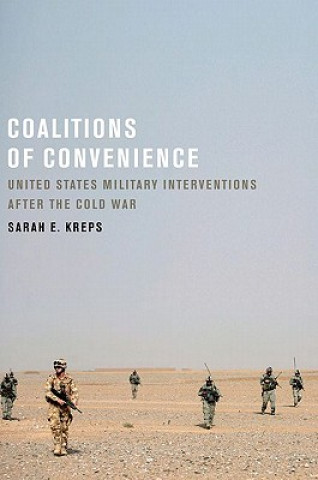
Kód: 04535571
Coalitions of Convenience
Autor Sarah E. Kreps
When the Clinton Administration sent the United States military into Haiti in 1994, it first sought United Nations authorization and assembled a large coalition of allies. With a defense budget 20 times the entire GDP of Haiti, wh ... celý popis
- Jazyk:
 Angličtina
Angličtina - Vazba: Brožovaná
- Počet stran: 240
Nakladatelství: Oxford University Press Inc, 2011
- Více informací o knize

Mohlo by se vám také líbit
-

American Metropolitics
1254 Kč -

Adult Survivors of Sexual Abuse
4599 Kč -

Developmental Problems of Childhood and Adolescence - Prevention, Treatment and Training
1784 Kč -

Cultures of Confinement
2230 Kč -

Advances in Cryptology - AUSCRYPT '90
1681 Kč -

Der Antichrist
254 Kč -

Die Grundlagen Der Japanischen Einfuhr Auslandischer Technologie
1830 Kč
Dárkový poukaz: Radost zaručena
- Darujte poukaz v libovolné hodnotě a my se postaráme o zbytek.
- Poukaz se vztahuje na celou naši nabídku.
- Elektronický poukaz vytisknete z e-mailu a můžete ihned darovat.
- Platnost poukazu je 12 měsíců od data vystavení.
Více informací o knize Coalitions of Convenience
Nákupem získáte 124 bodů
 Anotace knihy
Anotace knihy
When the Clinton Administration sent the United States military into Haiti in 1994, it first sought United Nations authorization and assembled a large coalition of allies. With a defense budget 20 times the entire GDP of Haiti, why did the US seek multilateral support when its military could quickly and easily have overpowered the 7,600-soldier Haitian army? The US has enjoyed unrivaled military power after the Cold War and yet in eight out of ten post-Cold War military interventions, it has chosen to use force multilaterally rather than going alone. Why does the US seek allies when, as the case of Haiti so starkly illustrates, it does not appear to need their help? Why in other instances such as the 2003 Iraq War does it largely sidestep international institutions and allies and intervene unilaterally? In Coalitions of Convenience, Sarah E. Kreps answers these questions through a study of US interventions after the post-Cold War. She shows that even powerful states have incentives to intervene multilaterally. Coalitions and international organization blessing confer legitimacy and provide ways to share what are often costly burdens of war. But those benefits come at some cost, since multilateralism is less expedient than unilateralism. With long time horizons--in which threats are distant--states will welcome the material assistance and legitimacy benefits of multilateralism. Short time horizons, however, will make immediate payoffs of unilateralism more attractive, even if it means foregoing the longer-term benefits of multilateralism. Coalitions of Convenience ultimately shows that power may create more opportunities for states such as the US to act alone, but that the incentives are stacked against doing so. The implications of the argument go beyond questions of how the US uses force. They speak to questions about how the world works when power is concentrated in the hands of one state, how international institutions function, and what the rise of China and resurgence of Russia may mean for international cooperation and conflict.
 Parametry knihy
Parametry knihy
Zařazení knihy Knihy v angličtině Society & social sciences Politics & government International relations
1238 Kč
- Plný název: Coalitions of Convenience
- Podnázev: United States Military Interventions after the Cold War
- Autor: Sarah E. Kreps
- Jazyk:
 Angličtina
Angličtina - Vazba: Brožovaná
- Počet stran: 240
- EAN: 9780199753802
- ISBN: 0199753806
- ID: 04535571
- Nakladatelství: Oxford University Press Inc
- Hmotnost: 324 g
- Rozměry: 236 × 166 × 16 mm
- Datum vydání: 28. April 2011
Oblíbené z jiného soudku
-

On Palestine
276 Kč -

Prisoners of Geography
276 Kč -

World Order
316 Kč -

International Relations, Global Edition
2702 Kč -

Grand Chessboard
557 Kč -

Diplomacy
462 Kč -

Clash of Civilizations and the Remaking of World Order
420 Kč -

Hundred-Year Marathon
389 Kč -

The Spy and the Traitor
306 Kč -

Understanding the Intelligence Cycle
1854 Kč -

Who Rules the World?
316 Kč -

Who Rules the World?
276 Kč -

Dead Aid
433 Kč -

World Order
358 Kč -

Adults In The Room
358 Kč -

Legacy of Ashes
441 Kč -

Evolution of Cooperation
474 Kč -

Strategic Vision
374 Kč -

Secret World
514 Kč -

Geopolitics and Geoculture
547 Kč -

Dawn of Eurasia
303 Kč -

How Spies Think
306 Kč -

Gaza in Crisis
303 Kč -

Planetary Cycles Mundane Astrology
480 Kč -

OVERTHROW : AMERICA'S CENTURY OF REGIME
509 Kč -

Is the EU Doomed?
612 Kč -

Directorate S
430 Kč -

Righteous Victims
511 Kč -

Europe's Border Crisis
1121 Kč -

America's Strategy in World Politics
1749 Kč -

Destroying Libya and World Order
480 Kč -

My Nationalist Pony
871 Kč -

Critical Practices in International Theory
5172 Kč -

amantes del fin del mundo
555 Kč -

American Century and Beyond
474 Kč -

Heroic Failure
286 Kč -

Oxford Handbook of the European Union
1429 Kč -

Rise and Kill First
462 Kč -

PEACE TO END ALL PEACE
488 Kč -

Tragedy of Great Power Politics
462 Kč -

Countdown to Zero Day
384 Kč -

Revenge of Geography
418 Kč -

Political Order and Political Decay
410 Kč -

Naked Diplomat
357 Kč -

Against Our Better Judgment
311 Kč -

After the Empire
360 Kč -

Legacy of Ashes
517 Kč -

Dragons and the Snakes
795 Kč -

Oxford IB Diploma Programme: Global Politics Course Book
1456 Kč
Osobní odběr Praha, Brno a 12903 dalších
Copyright ©2008-24 nejlevnejsi-knihy.cz Všechna práva vyhrazenaSoukromíCookies



 Vrácení do měsíce
Vrácení do měsíce 571 999 099 (8-15.30h)
571 999 099 (8-15.30h)